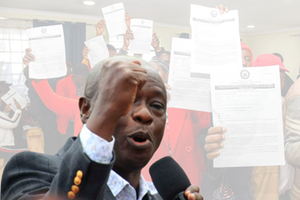Kenya's mental health journey: From ancient practices to modern stride

Prof Lukoye Atwoli, a professor in Psychiatry.
What you need to know:
- The 2010 Constitution had a progressive bill of rights that included the right to the highest attainable standard of mental health for Kenyans.
- In 2015, the Mental Health Policy of 2015-2030 was launched, providing a framework for strengthening mental health services and addressing stigma.
For centuries, issues of mental health were deeply rooted in Kenya's tradition.
The range of practitioners included herbalists, medicine men and diviners who sought spiritual explanations for misfortune, including mental illnesses.
“We also had witch doctors, who though viewed with apprehension, were sometimes consulted to reverse curses believed to be affecting a person's mental state," shared Prof Lukoye Atwoli, a professor in Psychiatry, during ‘Nation's’ second edition of Mental Wellness and Counselling Conference in September last year.
"There was no clear demarcation, even then, between mental illnesses and physical illnesses.
Because a person was seen as a whole individual, not as a composite of mental, physical and other components. However, some treatments were specific for what we would consider mental illnesses. Those conditions were often caused due to supernatural forces. You know either our ancestors, the gods, or some other spirits, which were punishing this individual for something they did, or something someone in their lineage did," he explained.
The arrival of the British in the late 19th century, Prof Lukoye remarked, is what brought the marked shift. Then, Western medicine was introduced, and the Nairobi Lunatic Asylum, converted from a former smallpox isolation centre, became the first dedicated mental health facility in 1910. While serving European settlers with mental health needs, it also became a place to confine Africans deemed mentally ill or expressing dissent against colonial rule. "It sounds funny today but people who were mentally ill in 1910 were called lunatics. Over time, the colonial government started using this facility as a prison and mental health as something that would punish people who said things with disagreement," he said.
In 1933, the British government took the Indian Mental Health Act and applied it to Kenya.
Sixteen years later, the colonial government in Kenya enacted the Mental Treatment Act based on the UK version of the same.
In 1959, the Mental Health Act of the UK was applied to Kenya and remained in force past independence up to 1989, when the previous version of the Mental Health Act was enacted by the Kenyan parliament. " And all this time, we didn't have a policy in mental health covering this," explained the researcher.
The 2010 Constitution had a progressive bill of rights that included the right to the highest attainable standard of mental health for Kenyans.
In 2015, the Mental Health Policy of 2015-2030 was launched, providing a framework for strengthening mental health services and addressing stigma.





